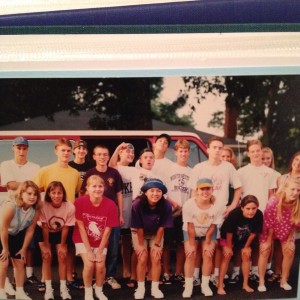 What do you picture when you imagine the future of the church? ATM machines positioned at every entrance, drones serving communion, or viewing a sermon telecast on your iPad?
What do you picture when you imagine the future of the church? ATM machines positioned at every entrance, drones serving communion, or viewing a sermon telecast on your iPad?
The future of the church is alive in your church now. “Train a child in the way he should go, and when he is old he will not turn from it” (Proverbs 22:6). The little children and youth are the leaders of our tomorrow. Every church has a story, and the ARP denomination wants to hear yours. We want to witness the precious moments with the younger generation and encourage the volunteers who are passionately building relationships with and training these future leaders.
This is the beginning of a series that will continue through the end of the year focusing on the future of the church. ARP Agency Directors were asked to explain their long-range plans along with the resources utilized to implement these goals. You will notice in this, May/June issue, Outreach North America expounds on this idea and how to encourage your congregation, especially the future generation of leaders. ONA has shared not only about church planting, but also about church vitality and how to meet people where they are. You can read more on page 16.
Below is taken from an interview with Rev. Boyce Wilson and Rev. Doug Jones, both former pastors of Ebenezer ARP Church, Rock Hill, SC, along with a few of the youth who grew up in Ebenezer.
So the big question is how did you do it? How do you build a youth group? How do you minister to them? How do you know the direction of their hearts? How do you train the future of the church?
Youth Leaders
It is vital to any church to have dedicated volunteers and staff involved in the ministries of children and youth. Ebenezer ARP has been fortunate enough to have staff positions making children and youth a top priority. During Doug Jones’ ministry, he would meet weekly with the staff to review and coordinate all programs and activities. Boyce Wilson emphasizes that Ebenezer’s youth ministry is strengthened by facilitating the Youth Council made up of parents, youth leaders, elders, deacons, and the youth director itself.
In determining the best fit for your church, it is important to have volunteers and staff who can identify with today’s generation. Growth and outreach in youth ministry is typically generated from the youth themselves bringing friends and even families to church. Building strong relationships is the core. The weekly large and small group meetings along with retreats, lunch dates, and sports activities are just a few examples of opportunities for life change.
Pastoral Counseling
Wilson suggests that, if possible, the pastor should learn the names of the children and youth, along with their interests and concerns. Engaging them after worship, ask about their lives and what is going on in the world around them. “My direct involvement in the youth ministry was through the preaching of God’s Word week-by-week in worship. It was not uncommon to see a quote from a sermon appear on a high school student’s Facebook page,” Wilson said.
Doug Jones used his children’s sermon as a way to teach a valuable lesson. The youth sat as a group and later discussed the sermon. Jones prepared sermons with all ages in mind, and in addition to teaching, always concluded with a challenge and an invitation for those who were led by the Holy Spirit to accept Christ as their Savior. The pastor would lead the communicants and new members classes, giving the opportunity to minister and relate on a deeper level.
“You can learn a lot from the youth of the church. They have real and vital relationships with Jesus Christ, which are shown in their boldness to speak up for Him among their peers and their desire to serve and reach out with the gospel. Simply put, I learned of their desire to speak the gospel and live the gospel,” Wilson said.
Congregational Support
“It is vital to have the congregation support the children and youth programs. Having an annual Youth Sunday set before the congregation shows the importance and vitality of youth ministry,” Wilson said.
Doug and Ruth Jones adapted several dramas to take advantage of the particular talents of the youth and wrote several original scripts for them. They strongly encouraged all who played various musical instruments to share their talents with the congregation as well. Each person in the drama was given an individual part—either speaking, singing a solo, a duet, trio, or quartet. These were performed at the church and even during World Focus at Bonclarken.
Conclusion
The Jones and the Wilsons have been grateful to God to see so many youth at Ebenezer committed to full-time Christian serving as ministers, missionaries, youth ministers, or Christian Educators. It is equally rewarding to know that others who did not feel led into full-time Christian service are now church officers, Sunday school teachers, and youth leaders in various churches.
It takes a church to raise the next generation. It is obvious after talking with Rev. Doug Jones and Rev. Boyce Wilson that it takes more than a pastor to raise and train the future of the church. The youth leaders, volunteer or paid, spend hours dedicating their energy and talents to leading children and youth programs. The support from the congregation financially and prayerfully is vital for a program to grow.
Will you use your talents and gifts to help your church with the next generation?
You can read real testimonies from a few of the students who were brought up in the Ebenezer ARP youth group by clicking on the May/June digital magazine to the right. You can see firsthand how God used the different staff and volunteers in the church to minister to each of them.
